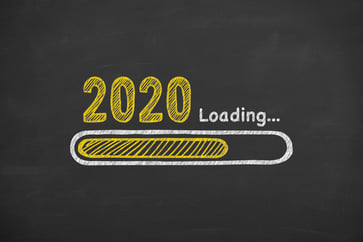Did you have a New Year’s Resolution this year? Any new habits you were trying to develop? How are those new habits coming along? We’re a few months in to 2020, and if you believe the data, you’ve probably fallen off the proverbial wagon by now on those new habits.
those new habits coming along? We’re a few months in to 2020, and if you believe the data, you’ve probably fallen off the proverbial wagon by now on those new habits.
Anecdotal evidence does suggest that it is a lot easier to find a parking place at the gym now than it was in the first few weeks of January, so I’m inclined to believe the data that only 64% of people who make resolutions are keeping them a month later, and only 8% successfully complete them. Forming new habits is hard. Changing old behaviors is really, really hard!
Don’t give up yet! If you are trying to start a new habit, here’s a list of tricks to try:
Build a scoreboard for yourself.
Write your goal down, and put a series of checkboxes for how many times you want to do that goal this week, or today. Put the scoreboard somewhere you can see it, and as soon as you’ve completed the new habit, put a check in that box!

I recently listened to a “Focus on This” podcast episode about how to make new habits stick. They recommended a mindset shift—stop thinking about the new habit as an achievement to conquer with a big reward at the end, and start thinking more about monitoring and rewarding incremental progress over time. They recommend using a “streak-tracker” (a fancy name for the scoreboard I just described) to slowly build confidence and maintain motivation over time.
The benefits of using this tool include keeping your goal visible, having a mechanism to hold yourself accountable to the goal, and the mental boost you get when you check items off your list. (Anyone who still enjoys keeping a paper to-do list that you can scratch or check off can confirm how good this feels.)
For example, if you want to drink more water, you could put a Post-it on your desk that says, “Drink eight glasses of water today” and put eight checkboxes on the note. Then, when you finish a glass, check it off. You’ll be able to see your progress and feel that satisfaction of checking it off. Eventually, the new habit will take over and you won’t have to remind yourself; you’ll automatically drink more water.
Of course, you can use Rhythm for this. For example, I have a goal to watch a webinar or read a chapter a week in a business book and write down my key takeaway and how I am going to apply what I learned. This is my way of living our company’s Keep Smart core value. I put this in Rhythm as a KPI, and I see it every day in my dashboard. When I complete the weekly learning activity, I immediately check that green box for the week, and I capture my learnings in a Comment right on that KPI. Boom—done! It feels great!
Enlist a buddy.
Call them whatever you want—an accountability buddy, a coach, a mentor, a peak performance pal—to share your goals with and who will check in periodically to see how it’s going will help you tremendously. Saying your goal out loud makes it real… and having someone actively checking to see how you’re progressing could be just what you need to keep yourself accountable to following through on the goal. Social pressure, when used in a constructive and safe way, is a powerful change agent.

Don’t beat yourself up!
Have you ever set a hard rule for yourself (ex. NO CHOCOLATE!) only to break it soon after? Then when you have that first bite of chocolate, you say, “Oh well! I failed at that, so now I’ll just eat all the chocolate I want!” We’ve all done this to ourselves at some point, and that’s why your mindset is so key.
Rather than setting harsh rules or restricting yourself, you will be more resilient in your efforts to make the habit stick if you can approach the change with a positive approach, curiosity and a desire to improve.
Let me illustrate this with an example. Who would you find more persuasive and be more likely to want to follow?
- A leader who says, “We are never going to make any mistakes, and the first person who makes a mistake will be fired in front of all of you as a form of deterrence."
- Or, a leader who says, “I wonder why we are making so many mistakes as a team? Let’s work together to figure out how we can make just one fewer mistake this week, and then the next week…who’s with me!"
If you can get your internal leader to sound more like #2, you’ll be more successful with your new habit, and you’ll probably be a lot happier, too.
So, if you’ve already ditched that New Year’s Resolution, that’s OK! How can you get a step closer this week to building that new habit? Experiment, set up your scorecard, enlist a buddy and see what happens!
Would you like to learn more on this topic? Here are some additional resources:
How top CEOs Close the Strategy Execution Gap
Follow Up: The Key To Leadership Development
Building Team Accountability: Job Scorecards
10 Signs of an Accountable Culture [Infographic]
Growing Team Accountability in Your Organization
Photo Credit: iStock by Getty Images




